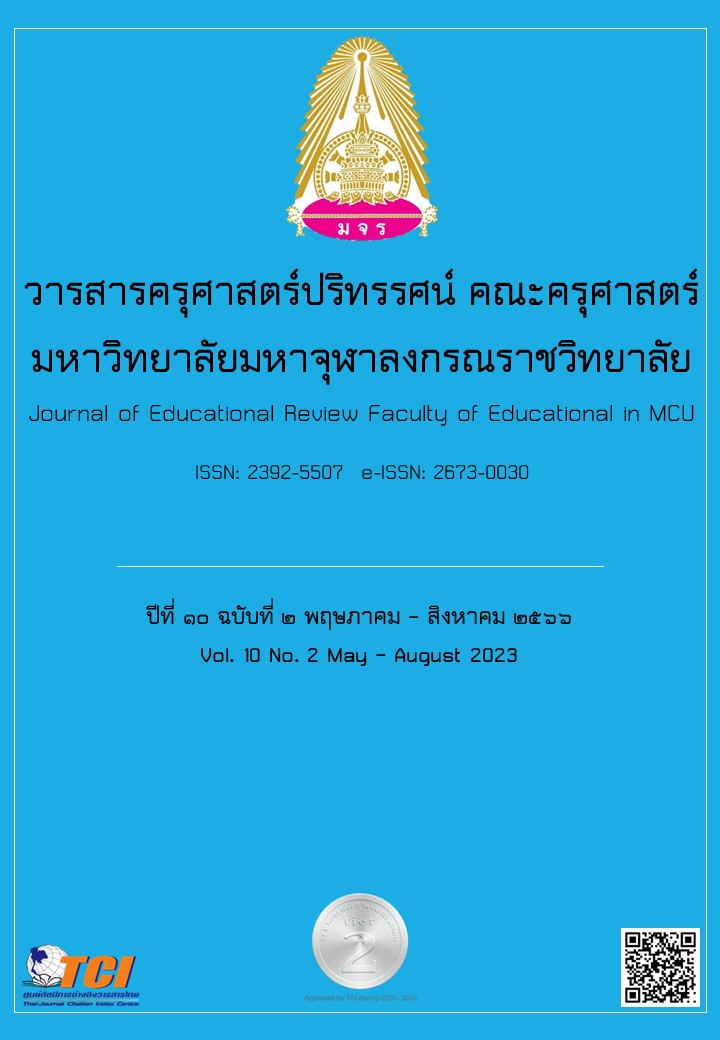DEVELOPMENT OF CORPORATE CULTURE IN THE DIGITAL ERA ACCORDING TO SANGAHAVATHU PRINCIPLES IN PRIMARY SCHOOL, PHRA NAKHON SI AYUTTHAYA DISTRICT, PHRA NAKHON SI AYUTTHAYA PROVINCE
Main Article Content
Abstract
The purposes of this thesis were 1) to study the condition corporate culture in the digital era according to Sangahavathu principles in primary school, Phra Nakhon Si Ayutthaya District, Phra Nakhon Si Ayutthaya Province. 2) to study the method of corporate culture development in the digital era according to Sangahavathu principles in primary school, Phra Nakhon Si Ayutthaya district, Phra Nakhon Si Ayutthaya Province. 3) to propose guidelines for development corporate culture in the digital era according to Sangahavathu principles of primary schools Phra Nakhon Si Ayutthaya District. Mixed methods research was used combines the methods of quantitative and qualitative research. The questionnaire was used as a quantitative data collection tool from a sample of 217 teachers and an interview questionnaire was used to collect qualitative data from five experts. Quantitative data were analyzed by using descriptive statistics consisted of mean and standard deviation whereas qualitative data was analyzed by content analysis. Results found that 1) the condition corporate culture in the digital era according to Sangahavathu principles in primary school, Phra Nakhon Si Ayutthaya District, Phra Nakhon Si Ayutthaya Province in all 4 aspects was at a high level. 2) the method of corporate culture development in the digital era according to Sangahavathu principles in primary school, Phra Nakhon Si Ayutthaya district, Phra Nakhon Si Ayutthaya Province, It consists of the development to bring about changes in intentions, ideology, methods, processes, and behaviors that are regularly practiced as the norm and encourage everyone to follow and integrate with the Sangahavathu principles. 3) the guidelines for development corporate culture in the digital era according to Sangahavathu principles of primary schools Phra Nakhon Si Ayutthaya District is development of the organization to change the organization culture Integrate with Sangahavathu principles with participation of everyone. Promote a good relationship between personnel in the organization itself and between the organization and personnel more. This will result in working with happiness, unity and achieving the highest goals.
Article Details

This work is licensed under a Creative Commons Attribution-NonCommercial-NoDerivatives 4.0 International License.
ทัศนะและความคิดเห็นที่ปรากฏในบทความในวารสารฉบับนี้ถือเป็นความรับผิดชอบของผู้เขียนบทความนั้นเพียงผู้เดียว และไม่ถือเป็นทัศนะและความรับผิดชอบของกองบรรณาธิการ
กองบรรณาธิการขอสงวนสิทธิ์ในการคัดเลือกบทความลงตีพิมพ์และจะแจ้งให้เจ้าของบทความทราบหลังจากผู้ประเมินบทความตรวจอ่านบทความแล้ว
ต้นฉบับที่ได้รับการตีพิมพ์ในวารสารครุศาสตร์ปริทรรศน์ คณะครุศาสตร์ มหาวิทยาลัยมหาจุฬาลงกรณราชวิทยาลัย ถือเป็นกรรมสิทธิ์ของคณะครุศาสตร์ มหาวิทยาลัยมหาจุฬาลงกรณราชวิทยาลัย ห้ามนำข้อความทั้งหมดหรือบางส่วนไปพิมพ์ซ้ำ เว้นเสียแต่ว่าจะได้รับอนุญาตจากมหาวิทยาลัยฯ เป็นลายลักษณ์อักษร
References
ก่อการ ไชยสงคราม. (2561). รูปแบบการเปลี่ยนแปลงวัฒนธรรมองค์การของโรงเรียนมัธยมศึกษา. ดุษฎีนิพนธ์การศึกษาดุษฎีบัณฑิต. มหาวิทยาลัยศิลปากร.
จุฑามาศ แก้ววิจิตร และคณะ. (2556). 123 สู่การเป็นองค์กรแห่งความสุข. พิมพ์ครั้งที่ 1. นนทบุรี:สำนักพิมพ์สองขาครีเอชั่น.
ชยากานต์ เรืองสุวรรณ. (2556). ความสัมพันธ์ระหว่างวัฒนธรรมองค์การกับประสิทธิภาพงานวิชาการของสถานศึกษา สังกัดสำนักงานเขตพื้นที่การศึกษาประถมศึกษาบึงกาฬ. วิทยานิพนธ์การศึกษามหาบัณฑิต. มหาวิทยาลัยราชภัฏมหาสารคาม.
เบญจมาภรณ์ เครือสุวรรณ. (2558). วัฒนธรรมองค์การของโรงเรียนกับคุณภาพชีวิตในการทำงานของครู สังกัดสำนักงานเขตพื้นที่การศึกษาประถมศึกษานครปฐม เขต 1. วิทยานิพนธ์ครุศาสตรมหาบัณฑิต. มหาวิทยาลัยศิลปากร.
ปิยะบุตร รักษ์วงษ์. (2556). ศึกษาภาวะผู้นำของผู้บริหารสถานศึกษาตามหลักสังคหวัตถุ 4 วิทยาลัย อาชีวศึกษาสระบุรี อำเภอเมือง จังหวัดสระบุรี. วิทยานิพนธ์พุทธศาสตรมหาบัณฑิต. มหาวิทยาลัยมหาจุฬาลงกรณราชวิทยาลัย.
พระคำจันทร์ คุณวโส (วงษ์ชาลี). (2555). ทัศนคติของครูผู้สอนต่อการบริหารงานตามหลักสังคหวัตถุ 4 ในโรงเรียนเครือข่ายกลุ่มที่ 1 เขตตลิ่งชัน กรุงเทพมหานคร. วิทยานิพนธ์พุทธศาสตรมหาบัณฑิต. มหาวิทยาลัยมหาจุฬาลงกรณราชวิทยาลัย.
ลลิตเทพ ทรัพย์เมือง. (2559). ต้องเริ่มที่คนเปลี่ยนองค์กรสู่ยุคดิจิทัล. แหล่งที่มา https://tma.or.th/2016/news_detail.php?id=306 สืบค้นเมื่อ 24 ก.ค. 2564.
วันชัย ปานจันทร์. (2560). วัฒนธรรมองค์การและการพัฒนาองค์กรแห่งการเรียนรู้. กรุงเทพมหานคร: สำนักพิมพ์มหาวิทยาลัยรามคำแหง.
Krejcie, R. V. & Morgan, D. W. (1970). Determining Sample Size for Research Activities. Educational and Psychological Measurement. 30(3). 607-610.


